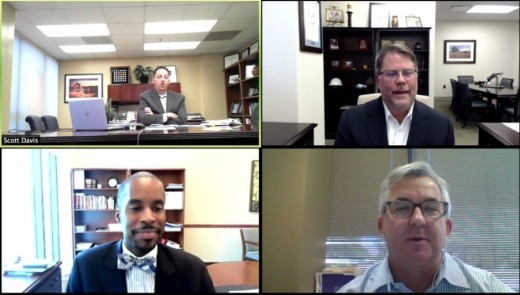Moderated by HNWCC President and CEO Bobby Lieb, panelists included Scott Davis, CEO of HCA Houston Healthcare Northwest; Keith Barber, CEO of Houston Methodist Willowbrook Hospital; and Mario Garner, president of CHI St. Luke's Health The Vintage Hospital.
The discussion was held just days after Texas became the first state in the U.S. to reach 1 million coronavirus cases and biopharmaceutical company Pfizer announced its vaccine candidate against COVID-19. While local health officials agreed a third spike in cases was likely on its way within the next month, they remained confident in the Greater Houston area hospital system's ability to handle another wave, touting steady hospitalization rates and successful treatment of many COVID-19 patients.
"We had a great opportunity in August to learn how to manage [spikes in COVID-19 cases] better, so if it does happen and we do see a larger surge than we anticipate, we will be ready in our hospitals to make sure that we take care of those patients," Davis said. " I know it can be a little bit unnerving ... relative to what we may see in another surge, but I think all those precautions that people are exercising will us get through."
Those precautions, which each of the health care leaders said are in place at their respective facilities, include enhanced cleaning protocols, wearing face coverings, adhering to social distancing standards, regularly washing hands and screening for COVID-19 symptoms. Health care officials said that while the recent vaccine development is promising news, distribution will take, time and COVID-19 precautions will still need to be followed well into 2021.
"We got great news from Pfizer the other day ... but the vaccine's not going to save us anytime soon, so the [precautions] are very important and need to be carried out for quite some time," Davis said. "I think we're going to get some immediate impact [from the vaccine] in the first quarter [of 2021] ... but obviously it will take some time to get [the vaccine distributed] worldwide."
Local health care officials added that they were hopeful COVID-19 vaccination would occur at a higher rate than other optional vaccinations, such as the flu.
"We've stayed pretty close to how the vaccine is coming about, and I think we believe that it has been a faster, but still a very solid due-diligence process," Barber said. "Certainly I anticipate that there will be people on the fence, but we'll watch as many will be vaccinated in the coming months."
On the heels of a presidential election and on the cusp of the 87th Texas Legislature, health care policies were also top of mind for the panelists. At both the state and federal level, Garner said he believed there were many reasons to be optimistic about the future of health care.
"We've already heard about an advisory board that has come together to help with resolutions to the COVID-19 pandemic to create an actual blueprint that will start Jan. 20, 2021," Garner said. "The new administration is also looking at Medicare/Medicaid expansion ... bringing down prescription and drug costs ... increasing access to treatment for patients [amid] the opioid crisis ... and ultimately eliminating disparities in case."
Garner added that as many individuals have lost their health insurance with their jobs as a result of the pandemic-induced economic downturn, it is important for constituents to communicate those needs to their local representatives ahead of the 87th Texas Legislature. Barber added it is likewise important to continue supporting federally qualified health care providers like Northwest Assistance Ministries and TOMAGWA HealthCare Ministries, who serve the medically indigent.
"At the end of the day, I think both political parties have positives and negatives relative to how they address health care," Davis said. "So I think if ... President-elect [Joe] Biden comes in—he definitely has different views than what President [Donald] Trump had—but I think at the end of the day, the [priority] is still making sure that we provide care for everyone who needs it. So as far as our consumers go, with this platform or the previous platform, it's going to allow that care to be expanded and provided to everyone who needs it."
Finally, each of the health care leaders urged the public to continue seeking medical care at their local emergency rooms as they said many patients have waited longer than they should have to get to a hospital out of fear of COVID-19.
"I would like to encourage [everyone to] still utilize your local emergency room if there is a life-threatening condition," Garner said. "Hospitals are safe to return [to]. We've had very good outcomes with our patients even amidst the pandemic, and we continue to be a safe provider of health care. So I want to make sure that all of our community partners know that hospitals are still safe places to go, so don't avoid us when you need to use us."





